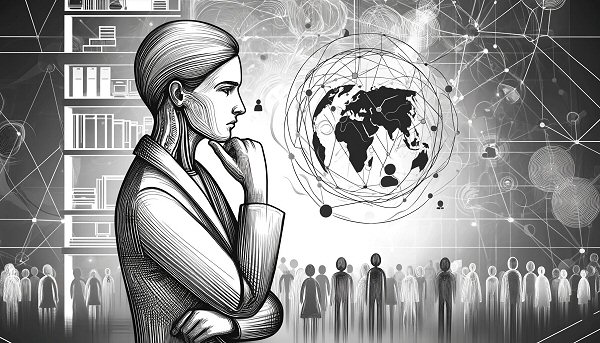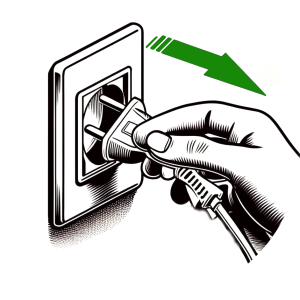Advances in artificial intelligence (AI) are making headlines. They offer promising prospects but also pose real threats.
Jean-Pierre Robert discusses several of these aspects and emphasizes the need to find a balance in response to these developments, starting with a return to self.
French version of this article

Contemplating AI and its implications
On this page
- Introduction
- Power of the psyche
- Only what seems plausible matters
- Who are the players in this new world?
- Counterfeiting and data theft
- At the heart of algorithms
- Appropriation of ideas, thoughts, and feelings
- Artificial replication of natural processes
- Reconsidering the soul’s importance
- We ought to… We should… We could…
- Rehabilitation of the feeling function
- Striking the right balance
Introduction
Over half a century ago, I started working in electronics and quickly became an IT specialist. Around the same time, I discovered a world that was then completely foreign to me: the world of depth psychology, also known as analytical psychology or complex psychology, initiated by Carl Gustav Jung.
Over the years, I’ve had the chance to closely track technological advancements. I’ve even shared in the excitement surrounding new products and services that promised to solve our difficulties.
The advent of the Internet, which bridged distances and facilitated boundless sharing, initially followed a similar trajectory. Yet, within just a few years, a different, more Machiavellian landscape emerged—a stark departure from the pioneering spirit of figures like Vint Cerf, Tim Berners-Lee, Lawrence Lessig, and others who laid the foundation for this network.
From the outset, the intimate connection forged with the depths of the psyche revealed to me the stark contrast between these two worlds. Today, I grasp the challenge I faced in reconciling outer and inner life.
Jung’s life journey, with its shadowy areas, served as a model. His questions, his courage to confront the psyche, and his unconditional acceptance of his destiny served as my compass. His immense erudition allowed me to discover a new, unsuspected world present since the dawn of time but covered with ashes by the agitation of our so-called « modernity. »
Power of the psyche
Throughout his life, Jung emphasized the power of the psyche, recognizing it as both a stabilizing factor and a source of imbalance. In 1952, he stated:
Everything now depends on man: immense power of destruction is given into his hand, and the question is whether he can resist the will to use it, and can temper his will with the spirit of love and wisdom.
And a few lines later:
Hence all unconscious nature longs for the light of consciousness while frantically struggling against it at the same time.
Answer to Job, CW11, 745.
Advances regarding the structure of the atom, radio waves, the cellular and molecular realms, and more have contributed to the creation of an increasingly artificial world.
Today, we have no choice. It is imposed on us whether we like it or not.
Only what seems plausible matters
I have the opportunity to engage with numerous individuals, including researchers from various disciplines, and I observe their vigilance and determination to confront the pervasive wave where falsehood often outweighs truth. What appears believable holds more importance than fact.
In the midst of this deluge of images, texts, and videos, it is evident that people struggle to navigate without the risk of drowning. Staying away from the water is difficult, as this artificial world imposes itself, invading us and crushing us like a tsunami.
Conversely, the psyche, muzzled and constrained by this hostile universe, unable to be recognized and express itself, erupts from within, pushing many people to adopt harmful, risky, and delinquent behaviors.
The consequences affect all areas of life, and warnings of all kinds (climate, environment, overpopulation, etc.) are only the tip of a very complex universe governed by rules that remain largely unknown.
Who are the players in this new world?
This hybrid world unfolding before our eyes leads to two opposing attitudes: great enthusiasm from the participants and their followers, and an equally contagious distrust and fear from everyone else.
Two professions play a major role in ongoing developments, though not all are involved. The first is computer scientists who, in small competing groups, code various applications—robots or assistants of all kinds—not forgetting the key piece, the real Trojan horse: our phone. We use it mainly for a multitude of tasks, each more addictive than the last, except for making phone calls.
The second profession is that of neurologists and psychologists who align themselves with neuroscience. Trapped by science and unable to open up to other perspectives than those offered by their means of investigation, they operate on the surface.
Like apprentice sorcerers with a partial consciousness that allows them to mobilize all their energy around a specific point, they swim in an abyssal unconsciousness. They are driven by a secret will for power and domination over nature.
Among many examples, the company Neuralink defines itself with « the ultimate goal of creating a generalized input/output platform capable of interfacing with every aspect of the human brain ». Furthermore, in May 2024, a team from Caltech succeeded in decoding unspoken words by recording neuron signals in real time with a significant success rate. Brain « hacking » is not far off…
Behind the scenes, a small number of actors are aware of what they are doing. The most powerful among them (Jeff Bezos, Elon Musk, Mark Zuckerberg, …) showcase science-fiction-like projects to function more effectively on a daily basis. They proceed covertly to subjugate the largest number of people with solutions that are largely useless and/or utopian.
In the shadows, a multitude of low-wage workers in countries with lax labor standards serve large corporations by correcting AI’s deviations and feeding it with data. Their mission is to filter harmful content, tag images or videos, and correct AI services to make them friendly and polite.
On the other hand, individuals such as Frances Haugen, Sophie Zhang, Timnit Gebru, and others recognize the flaws in these advancements. But when they speak out, their voices are suppressed and sidelined. They are even victims of harassment.
Nevertheless, concern was expressed among the main political leaders and AI players worldwide, prompting them to sign a preliminary document in November 2023 called the « Bletchley Declaration » on AI safety.
Counterfeiting and data theft
Simply observe children’s toys, even those designed for the very young, or use tools to generate text, image, or video. You’ll be convinced that everything is geared towards transforming these objects or services into our companions or friends, seamlessly coexisting with us.
Keep in mind that machines, however sophisticated, do not know what they are doing, feel no emotion, and have no feelings. They execute programs and mimic reality.
They recognize spoken language, interact, and simulate emotions because they were designed this way by humans to bring them closer to us. They also emerge as formidable competitors due to their tireless nature and unmatched speed of execution, powered by their computing capabilities.
Whether left unchecked or highjacked, they are on the brink of escaping their creators and generating outcomes that only a few insiders and whistleblowers mention quietly, overshadowed by the flood of misinformation.

These new tools would not have developed without a blatant plundering of private and public data. Each of us contributes to fueling these infernal mechanisms through our actions in various forms: articles, diverse reactions, likes, and more.
Before, we used computers. We still do. But today our computers also use us.
At the heart of algorithms
Have the major players in the tech industry not proclaimed themselves kings by adopting missions like « organizing the world’s information »? In return, they present information that has been sorted and reformatted using algorithms whose operations are opaque.
These interconnected algorithms have surpassed their creators. Amidst the rapid changes in the world they operate in (such as job transitions, layoffs, retirements, etc.), these algorithms have been on autopilot for a long time. They are at the heart of the tools at our disposal, from organizing information to governing the underlying mechanisms of social networks. No one controls anything anymore.
The door is open to all forms of information manipulation, bioterrorism, and cyber threats. Where are the safeguards? In this counterfeit world, what is the place and role of humanity?
Between techno-critics, techno-skeptics, techno-optimists, techno-humanists, and transhumanists, where do we stand? These diverse currents of thought often oppose each other, reflecting different approaches. The challenge lies in avoiding the unilateralism of any one of these perspectives. As Jung taught, the most difficult thing is to « hold the tension of the opposites. »
Appropriation of ideas, thoughts, and feelings
Most of us believe that the ideas, thoughts, and feelings we experience are our own. We assert ownership through copyright or patents. However, we often ignore or forget how much we are influenced by external and internal elements, and we generally confine ourselves to aggregating data and formatting it.
Machines created by humanity only perpetuate long-established practices, and organizations such as WIPO (World Intellectual Property Organization) are contemplating extending intellectual property rights to include AI.
Artificial replication of natural processes
Artificial replication of natural processes is the basis of technological advancement. Today, we face machines that simulate, organize, and contextualize diverse pieces of information at a speed surpassing that of humans.
Those who have honed their expertise in presentation and formatting through extensive training and hard work are the most vulnerable with the emergence of text, image, and video generation tools. They generally disdain these tools and express their skepticism with dismissive phrases such as « they’re just machines, » « machines don’t think, » « machines have no emotions, » and so on.
They feel threatened at their core because they identify with what they show of themselves, their knowledge, and their outward image, which Jung calls the persona. Without a connection to the source of all creativity, they are doomed to leave the stage prematurely and find themselves in often less desirable backstage areas.
Reconsidering the soul’s importance
Faced with this daunting new reality that overwhelms and consumes us, we are compelled to introspect and reconnect with ourselves.
In a paradoxical twist, the prevailing extraversion pushes us to expand our network of friends, engage in excessive communication, and consume goods and services. Yet, in substituting for genuine connections with our own roots, these activities deplete our planet’s resources.
Jung differentiates between directed thinking and spontaneous thinking. In 1912, he stated:
Directed thinking or, as we might also call it, thinking in words, is manifestly an instrument of culture, and we shall not be wrong in saying that the tremendous work of education which past centuries have devoted to directed thinking, thereby forcing it to develop from the subjective, individual sphere to the objective, social sphere, has produced a readjustment of the human mind to which we owe our modern empiricism and technics. These are absolutely new developments in the history of the world and were unknown to earlier ages.
Inquiring minds have often wrestled with the question of why the first-rate knowledge which the ancients undoubtedly had of mathematics, mechanics, and physics, coupled with their matchless craftsmanship, was never applied to developing the rudimentary techniques already known to them (e.g., the principles of simple machines) into a real technology in the modern sense of the word, and why they never got beyond the stage of inventing amusing curiosities.
There is only one answer to this: the ancients, with a few illustrious exceptions, entirely lacked the capacity to concentrate their interest on the transformations of inanimate matter and to reproduce the natural process artificially, by which means alone they could have gained control of the forces of nature. What they lacked was training in directed thinking.
The secret of cultural development is the mobility and disposability of psychic energy. Directed thinking, as we know it today, is a more or less modern acquisition which earlier ages lacked.
Two Kinds of Thinking, CW5, part 1, 17.
Many years later, in 1958, he noted:
This, in view of the crass undervaluation of the psyche in our predominantly materialistic and statistical age, sounds like a condemnation of religious experience. Consequently, the average intelligence takes refuge either in unbelief or in credulity, for to it the psyche is no more than a miserable wisp of vapour.
Flying Saucers: A Modern Myth of Things Seen in the Skies, CW10, 655.
Throughout his life, Jung consistently cautioned about the perils associated with general unconsciousness and emphasized the importance of cultivating heightened self-awareness for the collective good. He illustrated how such personal development contributes positively to the community.
We ought to… We should… We could…
In the midst of the opportunities presented by AI development, along with the aforementioned threats, there arises a cascade of imperatives like « We ought to », « We should », « We could, » and so on. For instance: « We ought to establish clear and universally accepted ethical principles for AI development and usage. » And: « We could establish an international body to oversee AI development and usage. »
While some of these imperatives seem self-evident, their implementation is challenging as they rely not on us but on others. Furthermore, those few in positions of decision-making authority often prioritize different objectives and remain indifferent to many proposals, persisting in pursuing illusory or outdated paths.
Given this observation, I find myself unable to offer advice to anyone, except to pose questions and propose potential answers. I urge each of us, within our unique contexts, cultures, environments, and based on the elements we receive from our psyche (dream images, spontaneous thoughts, emotions, feelings, …), to take a stand.
With extensive experience in this field, deeply immersed in the world of technology, and closely attuned to everything whispered from within, I am witness to the swirling currents around us, aspects of which resemble a collective delirium in many ways.
Rehabilitation of the feeling function
I now yield the floor to Marie-Louise von Franz, who in 1987 emphasized in her final lecture the importance of rehabilitating the feeling function [Jung Journal: Culture & Psyche, Vol. 2, No. 2, pp. 9-20]:
Our modern scientific and technological world and its mode of life are mostly influenced by scientists whose main function is extraverted or introverted thinking, coupled with extraverted or introverted sensation. […] The function of intuition is not completely ignored in physics because we need speculative intuitions for developing new models of thought.
She observes that the feeling function, relegated to the background, is inoperative:
But feeling is expressed only in the most generic, well-meaning should sentences. […] And with the exception of Bohr, all of these physicists collaborated or wanted to collaborate with the making of the atom bomb! In the circle of American physicists, we now have a definite influence of Hinduism, which, while not materialistic, nullifies the life of the individual human being.
She gives two examples that are still relevant today:
The inhumanity of modern physical medicine needs no more comment. The newspapers are full of it, but very little is done about it. […]
The feeling function is also badly lacking in our so-called help for underdeveloped countries. […] demonstrates how we help people of other cultures by wanting simultaneously to impose upon them our religious or scientific views, thus destroying their own spiritual foundations of life.
She highlights the link between feeling and our destructive activities:
All this destructiveness of ours results […] from a basic lack of respect for the other human being and his different system of values—in plain words, a lack of true differentiated feeling. In fact we know of the catastrophic results and of the increasing hatred of other nations against the white race, but we do not seem to be able to do anything about it.
[…] we apply the same unfeeling attitude within our own country, from one group to another. Our city- and land-planners, for instance, work out schemes in their offices, schemes of buildings on paper, which then destroy the happiness of uncounted people.
She continues by expressing the necessity « to first really acknowledge the reality of the unconscious (of God, i.e., the Self and of another, spirit-world) before we can do anything else. » She insists on the following fundamental point:
Ethics are based on the phenomenon of conscience, which derives from a relationship between man and god. […] or, as we call it psychologically, with the archetype of the Self.
According to von Franz, the most essential point is « the rehabilitation of Eros, or differentiated relatedness ». She further specifies the nature of this relatedness as: « relatedness to other human beings outside and to the archetypal powers within ».
Striking the right balance
Achieving stability in a profoundly unbalanced world is extremely challenging. Advocating for self-reflection while remaining open to others is demanding and involves deep engagement.
It is undoubtedly simpler to surrender to the collective that is eager to guide, entertain, and suppress any form of emancipation.
Recognizing and addressing one’s own shadow requires many sacrifices. It is much easier to shift blame onto others.

To conclude, I echo numerous testimonies indicating that a proper balance is achievable. Often, this requires « unplugging » and « dimming the ambient light » to better tune into what transforms us deeply.
Original article by Jean-Pierre Robert,
translation by Peggy Vermeesch.
July 2024
(Illustrations DALL-E)
Jean-Pierre Robert
Jean-Pierre Robert is the founder of Espace Francophone Jungien (1998). He oversees the publication of content, has authored several articles, book presentations, interviews, and manages the website layout. From 2017 to 2023, he co-facilitated Jungian-themed workshops in partnership with Chantal Armouet.
Articles
For a list of articles and interviews published in French, visit Jean-Pierre Robert’s page on EFJ.
